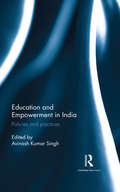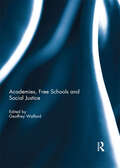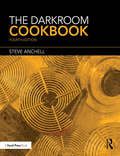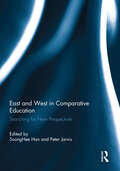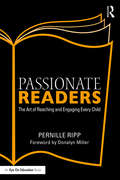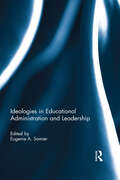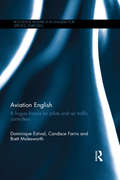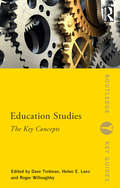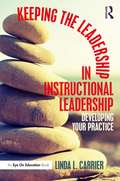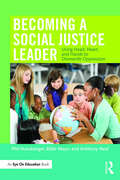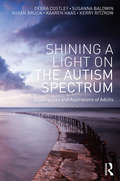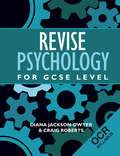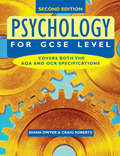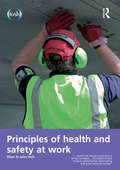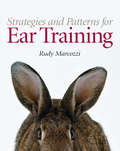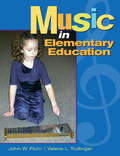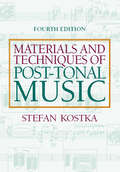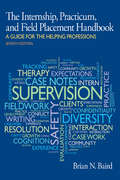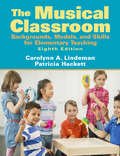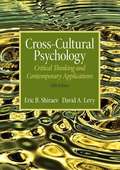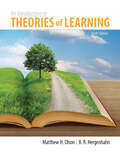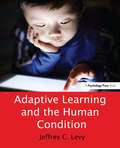- Table View
- List View
Education and Empowerment in India: Policies and practices
by Avinash Kumar SinghThis book explores the critical linkages between education and empowerment of women, marginalized groups and other disadvantaged sections of society. It: Provides an overview of educational policies and practices from India’s independence to the present day, and tracks relevant changes and amendments. Examines a range of issues connected with education such as the Right to Education Act; empowerment and community mobilization; higher education challenges and other emerging topics. Brings together both theoretical postulates and empirical findings.
Academies, Free Schools and Social Justice
by Geoffrey WalfordAcademies were introduced by Labour in 2000 and first opened their doors in 2002, but during Labour’s time in power the nature of the Academies changed. At first they were designed to replace existing failing schools but, by 2004, the expectation had widened to provide for entirely new schools where there was a demand for new places. From 2010, under the coalition government, two new types of Academy were introduced. While the original Academies were based on the idea of closing poor schools and replacing them by dramatically redesigned and restructured ones, the 2010 Academies Act allowed existing highly successful state-maintained schools to apply to become Academies as well. Further, while Labour had restricted Academy status to secondary schools, the Coalition extended it to primary and special schools. The result is that there has been a dramatic increase in the number and diversity of Academies. In addition to this, the 2010 Act introduced Free Schools, wherein groups of parents, teachers, or other sponsors can apply to start their own state-maintained, but officially ‘independent’, schools. These schools can either be completely new or the result of existing private schools applying to become state-maintained. The results of these changes remain under-researched. This book puts forward new research that examines the history and nature of Academies and Free Schools, the processes by which they have come into existence, and their effects in terms of social justice. The contributors do not all speak with one voice, but rather present a diversity of views on these important topics. Included in the collection are the results of research on pupil outcomes and socio-economic segregation; issues of identity and ethos in church academies; the problems of establishing free schools; the history of policy on Academies; and a comparison between Swedish independent schools and Academies and Free Schools. This book was originally published as a special issue of Research Papers in Education.
The Darkroom Cookbook (Darkroom Cookbook Ser. #Vol. 2)
by Steve AnchellThis is the classic guide for analog photography enthusiasts interested in high-quality darkroom work. The fourth edition from darkroom master Steve Anchell is packed with techniques for silver-based processing. In addition to "recipes" for darkroom experiments, this book contains invaluable information on developers, push-processing, reversal processing, enlarged negatives, pyro formulas, printing, and toning prints. The Darkroom Cookbook also offers advice about where to get darkroom equipment, how to set up a darkroom, safe darkroom working spaces, and more. Key features of this revised edition include: Over 200 step-by-step or do-it-yourself formulas Tips for mastering the "ingredients" of analog photography processing, namely the chemicals used to develop, fix, stop and tone Special technique contributions and stunning black and white imagery by professionals such as Bruce Barnbaum, Tim Rudman, John Sexton, and more.
East and West in Comparative Education: Searching for New Perspectives
by SoongHee Han and Peter JarvisSparked by global capitalism’s demand for new knowledge and new commodities, as well as new logistical systems to deliver them, the nature of education has changed significantly. Universities, in striving to become a part of this knowledge society, have focused on responding to these demands, at the expense of the humanities and social sciences. The dominance of this way of thinking, primarily a product of Western educational thought, has clearly affected approaches to education in the East. The originalities, authenticities, and unique perspectives of the East have failed to get enough attention, subsumed by the focus on science and technology. However many education systems are still endeavouring to capture some of the indigenous and authentic culture of their home countries, incorporating national cultural ideals, even in subjects with a primarily vocational focus. Although the drive for scientific knowledge has led to a degree of standardisation and convergence, cultural differences still play a role in the education theory and policy of different countries.This book examines these cultural differences between different East Asian and South Asian countries, with chapters ranging from historical educational analysis to contemporary re-interpretations of the construction of society and education in the East. This book was originally published as a special issue of Comparative Education.
Passionate Readers: The Art of Reaching and Engaging Every Child
by Pernille RippHow do we inspire students to love reading and discovery? In Passionate Readers: The Art of Reaching and Engaging Every Child, classroom teacher, author, and speaker Pernille Ripp reveals the five keys to creating a passionate reading environment. You’ll learn how to… Use your own reading identity to create powerful reading experiences for all students Empower your students and their reading experience by focusing on your physical classroom environment Create and maintain an enticing, well-organized, easy-to-use classroom library; Build a learning community filled with choice and student ownership; and Guide students to further develop their own reading identity to cement them as life-long, invested readers. Throughout the book, Pernille opens up about her own trials and errors as a teacher and what she’s learned along the way. She also shares a wide variety of practical tools that you can use in your own classroom, including a reader profile sheet, conferring sheet, classroom library letter to parents, and much more. These tools are available in the book and as eResources to help you build your own classroom of passionate readers.
Ideologies in Educational Administration and Leadership
by Eugenie A. SamierIdeologies in Educational Administration and Leadership explores ideological dimensions of educational administration in a number of Western and Central European contexts as they influence or shape the understanding, analysis, and practice in the field covering a broad range of topics, such as ethics, governance, diversity, and power. The first section, Philosophical and Theoretical Foundations, includes a range of sociological, political and linguistic approaches to examining ideology in an educational context. The second section, Ideologies of Research and Teaching, includes examinations of neoliberal and technological effects on research and teaching, as well as ideological shifts and challenges, in the West and in Eastern Europe. The last section, Contemporary and International Issues, includes critiques of social media, neoliberal impact on schooling, managerial leadership, university ideologies in Finland, the rationalisation of universities, and the impact of administrative ideologies on school systems. The book will appeal to researchers, practitioners, policy-makers, academics, as well as post-graduates in educational administration theory, and related courses in the ethics and politics of education, educational leadership, and organisational studies.
Aviation English: A lingua franca for pilots and air traffic controllers (Routledge Research in English for Specific Purposes)
by Dominique Estival Candace Farris Brett MolesworthAviation English investigates the key issues related to the use of English for the purpose of communication in aviation and analyses the current research on language training, testing and assessment in the area of Aviation English. Based on a series of recent empirical studies in aviation communication and taking an interdisciplinary approach, this book: provides a description of Aviation English from a linguistic perspective lays the foundation for increased focus in the area of Aviation English and its assessment in the form of English Language Proficiency (ELP) tests critically assesses recent empirical research in the domain. This book makes an important contribution to the development of the field of Aviation English and will be of interest to researchers in the areas of applied linguistics, TESOL and English for Specific Purposes.
Education Studies: The Key Concepts (Routledge Key Guides)
by Dave Trotman, Helen E. Lees and Roger WilloughbyWritten by educational specialists and including over fifty interdisciplinary entries, this essential compendium offers accessible, detailed definitions of the core concepts typically explored on undergraduate Education Studies courses. Its interactive design clarifies topics at an introductory, intermediate and advanced level, supporting students across the three years of their undergraduate study. The history and evolution of each concept is outlined with concepts practically grouped around four interrelated key educational categories - the personal, philosophy, practice and power. Key academic debates and points of contest are explored, reference to real-life educational examples are offered, and reflective questions and further reading scaffold critical engagement. Education Studies: The Key Concepts is a bookshelf must-have, moving readers towards a coherent stance based on theory and research. It is an easy-to-use resource for anyone looking to better understand education. It is also useful for those researching education at postgraduate level to broaden their educational knowledge base outside their specific foci.
Keeping the Leadership in Instructional Leadership: Developing Your Practice
by Linda L. CarrierIn a high-stakes and testing-focused school climate, principals strive to develop and refine the skills that will make them effective instructional leaders. This book discusses how a narrow focus on day-to-day operations and management can limit the potential for effective instructional leadership by drawing attention away from the behaviors and interpersonal skills that enable school administrators to succeed. Building on stories from experienced principals in school districts across the country, author Linda L. Carrier offers practical tips and strategies for restoring the human dynamic of instructional leadership. Keeping the Leadership in Instructional Leadership: Developing Your Practice is designed to facilitate personal reflection and conversation about leadership practice, and its advice will empower principals and administrators to transform their schools into highly engaged communities of learners.
Becoming a Social Justice Leader: Using Head, Heart, and Hands to Dismantle Oppression
by Phil Hunsberger Billie Mayo Anthony NealThis important book helps school leaders let go of a "comfortable" mindset and enter a world of courageous conversations that examine and challenge the impact of racism and other forms of oppression on disciplinary patterns, instructional practices, and school policies. Authors Hunsberger, Mayo, and Neal prepare you to address these difficult issues though authentic, critical discourse. The book includes classroom activities and facilitation tips to help prompt systematic changes in schools through improving instruction, supporting inclusiveness, and strengthening student engagement. After reading Becoming a Social Justice Leader you’ll be able to: Design conversations that support participant engagement and create a safe environment for discussion. Explore personal dispositions, attitudes, and stances that contribute to systemic oppression. Understand how oppression is established and sustained in order to enact change. Create alliances within school settings to foster dialogue and combat oppression. Additional worksheets that help educators examine and expand their work as social justice leaders are also available for download (http://www.routledge.com/products/9781138957749).
Disney, Culture, and Curriculum (Studies in Curriculum Theory Series)
by Jennifer A. Sandlin Julie C. GarlenA presence for decades in individuals’ everyday life practices and identity formation, the Walt Disney Company has more recently also become an influential element within the "big" curriculum of public and private spaces outside of yet in proximity to formal educational institutions. Disney, Culture, and Curriculum explores the myriad ways that Disney’s curricula and pedagogies manifest in public consciousness, cultural discourses, and the education system. Examining Disney’s historical development and contemporary manifestations, this book critiques and deconstructs its products and perspectives while providing insight into Disney’s operations within popular culture and everyday life in the United States and beyond. The contributors engage with Disney’s curricula and pedagogies in a variety of ways, through critical analysis of Disney films, theme parks, and planned communities, how Disney has been taught and resisted both in and beyond schools, ways in which fans and consumers develop and negotiate their identities with their engagement with Disney, and how race, class, gender, sexuality, and consumerism are constructed through Disney content. Incisive, comprehensive, and highly interdisciplinary, Disney, Culture, and Curriculum extends the discussion of popular culture as curriculum and pedagogy into new avenues by focusing on the affective and ontological aspects of identity development as well as the commodification of social and cultural identities, experiences, and subjectivities.
Shining a Light on the Autism Spectrum: Experiences and Aspirations of Adults
by Debra Costley Susanna Baldwin Susan Bruck Kaaren Haas Kerry RitzrowProduced in conjunction with Autism Spectrum Australia (Aspect), Australia’s largest provider of services with people on the autism spectrum, this new text explores the experiences, needs and aspirations of adults on the spectrum. The volume utilises the structure of a recent survey (the only one of its type in Australia and one of few conducted internationally) and presents data from the study with contributions from adults on the spectrum to illustrate the findings with first person accounts and case studies. By drawing on these unique experiences, this valuable resource is presented in a way that will be both engaging and accessible for a wide range of readers.
Shining a Light on the Autism Spectrum: Experiences and Aspirations of Adults
by Debra Costley Susanna Baldwin Susan Bruck Kaaren Haas Kerry RitzrowProduced in conjunction with Autism Spectrum Australia (Aspect), Australia’s largest provider of services with people on the autism spectrum, this new text explores the experiences, needs and aspirations of adults on the spectrum. The volume utilises the structure of a recent survey (the only one of its type in Australia and one of few conducted internationally) and presents data from the study with contributions from adults on the spectrum to illustrate the findings with first person accounts and case studies. By drawing on these unique experiences, this valuable resource is presented in a way that will be both engaging and accessible for a wide range of readers.
Revise Psychology for GCSE Level: OCR
by Craig Roberts Diana Jackson-DwyerThis is a comprehensive student revision guide for those taking the GCSE OCR Psychology exam. It summarises the specification material clearly and attractively, enabling students to easily digest and retain the information. Packed full of revision tips and techniques, the book includes a number of unique and helpful features: Overviews of the OCR specification content Summaries of the major research studies Practical and innovative suggestions for revision techniques at the end of each chapter Example exam questions and model answers A separate chapter dedicated to preparing for the exam, giving practical advice on getting organised, techniques for maximising revision time, and advice on structuring exam time appropriately for optimum performance A comprehensive glossary of important terms and their definitions, to aid understanding of the material. Revise Psychology for GCSE Level gives excellent guidance, not only on how to pass the exam, but also on how to avoid the panic and pitfalls that so many students face at exam time. Although a companion to the bestselling Psychology for GCSE Level, 2nd edition by Dwyer and Roberts, this revision guide can be used alongside any GCSE psychology textbook.
Psychology for GCSE Level (500 Tips)
by Craig Roberts Diana DwyerWritten by two experienced psychology teachers and examiners, this textbook provides thorough coverage of both the AQA and OCR GCSE Psychology specifications. The user-friendly layout clearly identifies which sections are pertinent to each specification. The book is produced in attractive full colour with plenty of photographs, pictures and cartoons, and provides a variety of student-friendly features, including: A list of the AQA and/or OCR specification requirements for each topic An everyday-life case study to introduce each chapter Numerous classroom activities Key terms highlighted and defined throughout the text Aims and Learning Outcomes, which highlight the general themes and processes (including why psychology matters, how psychology works, everyday life, ethical issues, diversity, critical thinking and methodology) Research studies with evaluations Clear and concise chapter summaries Exam hints and tips Exam-style questions. This new edition is accompanied by a set of online multimedia resources, including powerpoint lecture courses and multiple-choice questions tests, available free-of-charge to schools who adopt this book as their text.
Principles of Health and Safety at Work
by Jim Allen Allan St HoltThis is a reprint of ISBN 978-0-901-35743-4 Widely acknowledged as the one stop summary of health and safety fundamentals, Principles covers law, safety technology, occupational health and hygiene and safety management techniques. Originally written by the late international health and safety expert Allan St John Holt, this new edition has been comprehensively updated by Allan's colleague Jim Allen. The book is designed as a concise, accessible introduction to health and safety basics and includes revision notes and a wide range of references. It is a first class resource for NEBOSH Certificate students.
Strategies and Patterns for Ear Training
by Rudy MarcozziA complete, progressive course that teaches musicians how to notate music from audio examples, held on downloadable resources. Basic melodic dictation is followed by progressively more complex scores, in classical, jazz, and popular styles. Designed for the two year undergraduate sequence, Strategies and Patterns for Ear Training offers valuable strategies to students and teachers alike.
Music in Elementary Education
by John Flohr Valerie TrollingerBased on the National Standards, this text is divided into three parts. Part one, Foundations, covers the rationale for a Music Education program in the elementary years; meaning and musical experience; and elements and kinds of music. Part two– Music Elements, Curriculum and Avenues to Music Learning–covers curriculum development; music for special needs students; avenues to music learning and historic and contemporary approaches. Part three–Musical Experiences– is grouped by avenues of music learning and grades. Thanks to years of thorough research, Music in Elementary Education promises is a standard text in the field.
Materials and Techniques of Post Tonal Music
by Stefan KostkaThis text provides the most comprehensive analytical approach to post-tonal music available, from Impressionism to recent trends. It covers music from the early 1900s through the present day, with discussion of such movements as Minimalism and the Neoromanticism, and includes chapters on rhythm, form, electronic and computer music, and the roles of chance and choice in post-tonal music. Chapter-end exercises involve drills, analysis, composition, as well as several listening assignments.
The Internship, Practicum, and Field Placement Handbook
by Brian N. BairdThe Internship, Practicum, and Field Placement Handbook, Seventh Edition is a practical guide to the real world knowledge and skills that students need when they begin working in the field of mental health. This text guides interns through every phase of the internship process from finding placements to concluding relationships with clients and supervisors. Along the way students learn about ethics, clinical writing and record keeping, working with peers and supervisors, understanding diversity, and self care and safety. Following an evidence and competency based approach, the latest research findings are reviewed from the fields of psychology, social work and counseling. "
Musical Classroom: Backgrounds, Models, and Skills for Elementary Teaching
by Carolynn LindemanWith this Eighth Edition, The Musical Classroom celebrates thirty years as a leading resource for future and in-service teachers as they engage children in the exciting world of music! Teachers, with the help of this user-friendly text, can develop the understandings and skills needed to teach elementary school music. The forty-four model lessons are the centerpiece to the book's long-lasting success. A collection of over 170 children's songs from around the world; instructional information for learning to play the recorder, keyboard, guitar, and Autoharp(TM); and the theoretical, pedagogical, and practical backgrounds needed for reaching all learners complete the comprehensive resource of The Musical Classroom. Note: This is the standalone book. If you want the accompanying audio CD, order the ISBN 9781138656703, which is available for separate sale.
Cross-Cultural Psychology: Critical Thinking and Contemporary Applications, Fifth Edition
by Eric B. Shiraev David A. LevyDynamic author team provides comprehensive overview with focus on critical-thinking. The fifth edition continues a heavy focus on applying critical thinking framework in examining, analyzing, and evaluating psychological data. With significant rewriting and additional new topics as well as updated references on new research, Cross-Cultural Psychology keeps pace with the rapidly changing conditions of modern times. The dynamic team from two different worlds bring a unique set of experiences and perceptions in writing this book. Eric Shiraev was raised in the city of Leningrad in the former Soviet Union and David Levy is from Southern California,. Between the diverse backgrounds and having each author spent an extended period teaching in the other's home country, the authors provide a comprehensive review of theories and research in cross-cultural psychology. Learning Goals Upon completing this book, readers should be able to: Better understand the field of cross-cultural psychology Understand contemporary theories and research in cross-cultural psychology Use critical thinking to examine, analyze, and evaluate the field of cross-cultural psychology Assist current and future practitioners from a wide variety of fields and services
Basic Conducting Techniques
by Joseph A. LabutaBasic Conducting Techniques is a practical and innovative textbook that provides sound, time tested procedures and material for the beginning conducting class. Students and professors have responded enthusiastically to the hands-on, conductor competency approach of this student-oriented textbook with its clearly stated objectives and performance tests. NOTE: This is the standalone book. If you want the accompanying Media DVD, order the ISBN 9780136011941.
Introduction to Theories of Learning: Ninth Edition
by Matthew H. OlsonDefines learning and shows how the learning process is studied. Clearly written and user-friendly, Introduction to the Theories of Learning places learning in its historical perspective and provides appreciation for the figures and theories that have shaped 100 years of learning theory research. The 9th edition has been updated with the most current research in the field. With Pearson's MySearchLab with interactive eText and Experiment's Tool, this program is more user-friendly than ever. Learning Goals Upon completing this book, readers should be able to: Define learning and show how the learning process is studied Place learning theory in historical perspective Present essential features of the major theories of learning with implications for educational practice Note: MySearchLab does not come automatically packaged with this text. To purchase MySearchLab, please visit: www.mysearchlab.com or you can purchase a ValuePack of the text + MySearchLab (at no additional cost).
Adaptive Learning and the Human Condition
by Jeffrey C. LevyAdaptive Learning and the Human Condition presents the basic principles of classical (Pavlovian) and instrumental (Skinnerian) conditioning in a more coherent and expansive manner than is the case in other textbooks. Learning is defined as an adaptive process through which individuals acquire the ability to predict, and where possible, control the environment. This overarching definition enables integration of traditional Pavlovian and Skinnerian principles and terminology and makes explicit why treatment of the learning process is essentially limited to these two historical research paradigms. Pavlov developed a methodology for studying animals under circumstances where they could predict, but not control, sequences of environmental events. Skinner studied animals under circumstances where their behavior had an effect upon environmental events. Observational learning and symbolic communication (i.e., spoken or written language) are incorporated as indirect learning processes through which individuals can acquire the ability to predict or control. This treatment creates a perspective within which it is possible to consider the fundamental nature of the learning process in understanding the human condition and in addressing significant individual and social concerns. Examples of applications and issues not included in similar textbooks include: The role of classical and instrumental conditioning in language acquisition The administration of rewards and punishers in Baumrind’s parental styles as related to Kohlberg’s stages of moral development Stone-Age hunter-gatherer and technologically-advanced cultures: How did we get from there to here? Self-control and self-actualization While covering traditional technical and theoretical issues, the book is written in a clear, engaging style. The narrative builds across chapters, culminating in the treatment of applications and societal concerns of import and interest to students and faculty alike. Upon completing this book, readers should be able to: explain the significance of human condition through adaptive learning; present the basic principles of classical and instrumental conditioning; and understand the significance of scientific research
